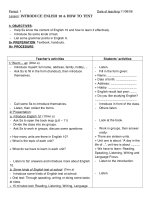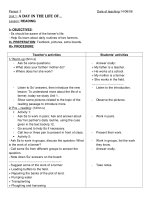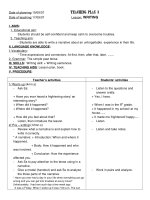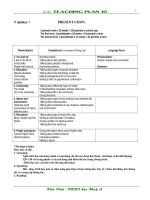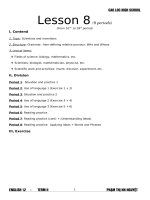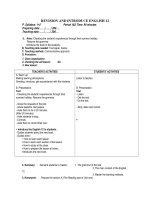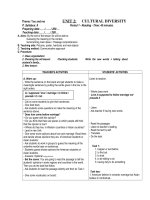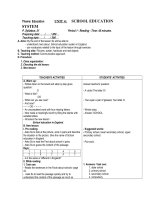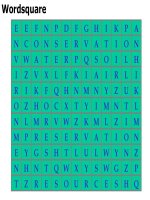date mar 22 06 teaching plan nguyen son ha period 80 unit 13 festivals date 1032010 getting started listen and read 1 objectives by the end of the lesson ss ‘ll be able to see the festivals and
Bạn đang xem bản rút gọn của tài liệu. Xem và tải ngay bản đầy đủ của tài liệu tại đây (78.04 KB, 10 trang )
<span class='text_page_counter'>(1)</span><div class='page_container' data-page=1>
<b>Period 80 UNIT 13 FESTIVALS </b>
<b>Date: 10/3/2010 </b>
<b>GETTING STARTED & LISTEN AND READ</b>
<b> </b>
<b>1.Objectives: By the end of the lesson, Ss ‘ll be able to see the festivals and beautiful places</b>
in Vieät Nam.
<b>2 . Language contents: </b>
<i><b>* Vocabulary</b></i> : rice-cooking festival, comptitionwater-ftching, fire-making, ……
<i><b>* Grammar</b></i> : Compound word
<b>3. Techniques: Group / pair work , Questions and answers</b>
<b>4. Teaching aids: Pictures and cassette player</b>
<b>5. Procedures : </b>
<b>Stages/Time</b> <b>Contents</b> <b>Notes</b>
<b>Check up</b>
<b> 15’</b>
<b>Presentation</b>
<b> </b>
* 15’Test
<i><b>Complete these sentences, using the Past</b></i>
<i><b>progressive or Simple past tense.</b></i>
1. when he (do)………… his homework, his father
(read) ………… a book.
2. Lan (play) ………… skip rope while Nga and Mai
(talk) ………… .
3. My grandmother (tell) ………… us stories at 7
o’clock last night.
4. What you (do) ………… at 4pm yesterday ?
5. Your sister (cook) …………dinner while you
(clean) ………… the floor ?
<b>I. GETTING STARTED</b>
Work with the partner . Say where should these
people go on there visits to Viet Nam ? – Why ?
EX: 1.He should go to Nha trang.
2.He should go to Hoi An.
3.He should go to Sapa
4.Oliver should go to Bat Trang.
5.He should go to HCM city.
<b>II. LISTEN AND READ</b>
<i><b>* New words</b></i>:
- festival (n)
- compitition (n)
- water-fetching (n)
T: give a 15’test on the
board and ask Ss to do it.
Ss: do the test on their
paper
T: collect Ss’answwers
</div>
<span class='text_page_counter'>(2)</span><div class='page_container' data-page=2>
<b> </b>
<b>Practice</b>
<b> 15’</b>
<b>Conduction</b>
<b> 3’</b>
<b>Homework</b>
<b> 2’</b>
- upset (a)
-yell (v)
-urge (v)
-pieces of bamboo
-rub (v)
-separate (v)
-husk (n)
Notes : Compound noun used as adjective
Form : Noun + V-ING
Example : rice-cooking / bull-fighting
Questions :
1. Who are talking in the dialodue ?
2. Where are they now ?
3. What is the festival’s name ?
<i><b>1. Practice the dialogue</b></i>
<i><b>2. True or false ?</b></i>
<i><b>*Answer key</b></i> :
a – F : Four team members take part in the
contests
b – F : One person must collect one water bottle .
c – T
d – F : Pieces of bamboo are used to make the
fire
e – F : The judges taste the rice .
f – T
- Do you like festivals ? Why ?
(If possiple , Students can talk about their village
festival)
- Learn new words by heart
- Practice te dialogue at home
- Prepare : SPEAK
- explain
- explain
- explain
Example
T: Explain and give
example
Ss: listen and answer
questions
Ss: pair work
T: correct Ss’ spelling
mistakes (if nessarry)
T: hang an extra board for
2/122.
Ss: look at the sentences
and read the dial and
decide which one is true
/false
group work
Each group writes its
answers on the board
T: correct and give the keys
Ss see the dialogue again
Ss listen and pratice the
dialogue again
Ss: take notes
</div>
<span class='text_page_counter'>(3)</span><div class='page_container' data-page=3>
<b>Period 81 UNIT 13 SPEAK AND LISTEN </b>
<b>Date: 17/3/10 </b>
<b>1. Objectives: By the end of the lesson, Ss ‘ll be able to talk about festivals. </b>
2. Language contents:
<i><b>* Vocabulary</b></i> : beach blossom,marigold,candies,dried watermelon seeds
<i><b>* Grammar</b></i> : Present simple
<b>3. Techniques: Group / pair works, extra board</b>
<b>4. Teaching aids: Pictures and cassette player</b>
<b>5. Procedures </b>
<b>Stages/Time</b> <b>Contents</b> <b>Notes</b>
<b>Check up </b>
<b> 3’</b>
<b>Pre-speaking</b>
<b> 5’</b>
<b></b>
<b>While-speaking</b>
<b> 10’</b>
<b></b>
<b>Post-speaking </b>
<b> 5’</b>
<b>SPEAK </b>
<i><b>* Questions</b></i> :
- What do you do for your Tet ?
- Did you tidy your house / make cakes … ?
- What did you prepare for your house /
yourself ?
<i><b>1. Work with the partner . Mrs Quyen is</b></i>
<i><b>talking to Lan about their prepareation for</b></i>
<i><b>Tet . Put the sentences in the correct answer . </b></i>
<i><b>* Correct order</b></i>: A-F-C-H-D-J-B-G-H-I
Practice speaking the dialogue
<i><b>* Modal</b></i>:
A: Is your school festival tomorrow ?
B: Yes, that’s right.
A: What do you often do before the festival ?
B: We send some letters of invitation to our
old friends, repaint the doors and
windows. Would you like to take part in
the festival with us ?
A: Yes, I’d love to. But I’m very busy now.
Bye.
B: Goodbye.
<i><b>* English speaking </b></i>
Ss: read the dialogue
answer some questions
about this dialogue .
Ss: listen and answer the
questions
Individual work
Ss: work in pairs to put the
sentences in the correct order
T and class correct, if
neccessary
- pair work
Ss choose the festival they like
in 2 ( page 123) to speak
Ss: Pair works
Feedback
correction
Ss: Look at pictures about some
festivals in Viet Nam . Ss work
in groups to talk what the people
do
</div>
<span class='text_page_counter'>(4)</span><div class='page_container' data-page=4>
<b>Pre-listening</b>
<b> 5’</b>
<b></b>
<b>While-listening</b>
<b> 7’</b>
<b>Post-listening</b>
<b> 5’</b>
<b>Homework</b>
<b> 3’ </b>
<b>LISTEN </b>
<i><b>* New words</b></i>:
-beach blossom (n)
-marigold (n)
-candies (n)
-dried watermelon seeds
<i><b>1.Listen to the conversation and fill in the</b></i>
<i><b>gaps.</b></i>
<i><b>* Answers</b></i>:
(1): John (2): flower market
(3): traditional (4): dried watermelon seeds
(5): make
<i><b>2. Complete the notes</b></i>.
- Mr. Robinson: <i>buy some peach blossoms and</i>
<i>a bunch of marigolds</i>.
- Liz: <i>buy a pack of dried watermelon seeds</i>.
- Mrs. Robinson: <i>ask Mrs. Nga how to make </i>
<i>spring rolls.</i>
<i><b>* Enlish speaking</b></i> :
talk about what you prepare for Tet and what
you buy for Tet.
-Write a paragragh about one of the festivals
in exercise 2
-Prepare : READ “-What do you know about
Chritmas ?”
Ss: guess what the Robinsons
prepare for Tet.
Ss write what they guess on a
large paper.
Ss: say what they guess.
T: give new words
Realia
Realia
Realia
Realia
Ss: listen to the tape ( three
times) and fill in the gaps
T: have a look at Ss’papers to
see what they heard.
Some Ss fill in the gaps on the
board.
Ss: listen to the tape (sentence
by sentence) and check
T: correct (if necessary)
Ss: work in groups to complete
the notes
Share their answers
Feedback
Correction
Ss: talk about what they prepare
for Tet and what they buy for
Tet.
Ss: individual work
feedback
Ss: take notes
</div>
<span class='text_page_counter'>(5)</span><div class='page_container' data-page=5>
<b>Period 82 UNIT 13 READ</b>
<b>Date:21/3/ 10 </b>
<b>1.Objectives: By the end of the lesson, Ss ‘ll be able to see the history of Christmas. </b>
<b>2 . Language contents: Present simple , Passive form</b>
<b>3. Techniques: Group / pair works </b>
Prediction, Questions and answers
<b>4. Teaching aids: Pictures, extra board </b>
<b>5. Procedures </b>
<b>Stages/ Time</b> <b>Contents</b> <b>Notes</b>
<b>Warm up </b>
<b> 5’</b>
<b>Pre-reading</b>
<b> 10’</b>
<b></b>
<b>While-reading</b>
<b> 20’</b>
<i><b>* Questions</b></i>:
- What do you often do at Christmas?
- Do you celebrate Christmas ?
<i><b>* New words:</b></i>
-decorate (v)
-custom (n)
-spead (v)
-design (v)
-patron saint (n)
-jolly (a) = funny
-Santa Claus (n)
-description (n)
-base (v)
<i><b>* Questions</b></i>:
- What’s the text about ?
- What and who are talked about in the text?
<i><b>1. Complete the table </b></i>
<i><b>* Answers</b></i>:
<i><b>Christmas </b></i>
<i><b>specials</b></i> <i><b>Place </b><b>of </b></i>
<i><b>origin</b></i>
<i><b> year</b></i>
<i>The Christmas </i>
<i>tree</i>
<b>Riga</b>
<i>Early 1500s</i>
<i>The Christmas </i>
<i>card</i> <i>England</i>
<b>Mid-19th</b>
<b>century</b>
<b>Christmas </b> <i>No </i> <i>800 years ago</i>
Ss: Talk about what they
often do for Tet
Ss: look at the pictures and
guess what they are about.
Ss: read 4 passages quickly
-picture
-explain
picture
-explain
Ss: Practice reading new
words
Ss: read the text silently and
answer these questions.
T: Explains how to complete
the table 1/ page 126.
Ss: work in group to complete
the table.
Two groups write their
answers on the board for
discussion
</div>
<span class='text_page_counter'>(6)</span><div class='page_container' data-page=6>
<b>Post reading</b>
<b> 7’</b>
<b>Homework </b>
<b> 3’</b>
<i><b>2. Answer the questions : ( 2. page 126 )</b></i>
<i><b>* Answers</b></i>:
a. More than a century ago
b. Because he wanted to send it to his friends
c. 800 years ago. d. Professor Moore did.
e. On the description of Saint Nicolas in
Professor Moore’s poem.
<i><b>* Speaking about Christmas</b></i>
Ss’ conversation
- Read the text and study the information about
Christmas .
- Prepare : WRITE
Ss: pair work
Some Ss write their
sentences on the board. Other
Ss and teacher correct them,
if necessary.
Ss: Group works
Ss: Pair works
Ss: take notes
<b>Period 83 UNIT 13 WRITE</b>
<b>Date: 21/3/10 </b>
<b>1.Objectives: By the end of the lesson, Ss ‘ll be able to write a report. </b>
<b>2 . Language contents:</b>
<i><b>* Vocabulary</b></i> : communal, husk
<i><b> * Grammar</b></i> :Compound words , Passive form
<b>3. Techniques: Group / pair works / Prediction </b>
<b>4. Teaching aids: Pictures </b>
<b>5. Procedures </b>
<b>Stages/ Time</b> <b>Contents</b> <b>Notes</b>
<b>Check up </b>
<b> 5’</b>
<b>Pre-writing</b>
<b> 10’</b>
Ss: answer the questions about
Christmast
- How long ago did the Christmas
tree come to the USA ?
- What is Santa Claus based on ?
- What do you do at Christmas ?
T: stick the picture/126 on the
board and ask Ss to look at the
picture of a contest and guess the
name of the festival.
Ss: feedback
T: hang an extra board for
ex1/127
</div>
<span class='text_page_counter'>(7)</span><div class='page_container' data-page=7>
<b></b>
<b>While-writing</b>
<b> 20’</b>
<b>Post-writing</b>
<b> 7’</b>
<b>Homework </b>
<b> 3’</b>
<i><b>* New words</b></i>:
- communal (a) :
- husk (n) :
<i><b>1. Fill in the gaps in this report :</b></i>
* A<i><b>nswers:</b></i>
(1): rice-cooking (2): one/a
(3): water-fetching (4): run
(5): water (6): traditional
(7): bamboo (8): six
(9): separate (10): added
<b>* Notes:</b>
1. Name of the festival
2. place of the festival
3. How long the festival lasted
4. Activities
5. organization of the activities
6. people taking part in the activities
7. Your thought of the festival
<i><b>2. Writing a report on a festival…… </b></i>
<b>* Modal: The “Caàu Ngư” Festival</b>
This report shows how the “Cầu Ngư”
festival was held.
The festivalwas held on the beach in the
OÂNG temple’s yard. It took one day. The
strong boys in the village fenced. The
oldest man prayed for his villagers’
wealthy.
The festival was wonderful.
<i><b>* English speaking </b></i>
EX: - What festival do you like ?
- I love the Cầu Ngư festival.
- Where was it held?
- It was held in the OÂNG temple’s
yard.
……
- Write a report on festival you like
- Prepare : LANGUAGE FOCUS
Vnese
Realia
Ss: work in group to complete the
report.
Each group gives its words.
T and other group correct the
mistakes,if necessary.
Ss: read the report and find out
the way of writing a report.
Ss: read the sentence in the
report that goes with each
number.
- The Rice-Cooking Festival
- In the communal house yard
- ……
- Wonderful
Ss: read the questions ( 2. p127).
And then write a report on the
festival they like.
Ss: groupwork
Share their writing
T: take Ss’writing and correct
Ss: discuss about the reports on
the board.
Ss: ask their friends about the
festival they like.
Pairwork
Ss: take notes
</div>
<span class='text_page_counter'>(8)</span><div class='page_container' data-page=8>
<b>Date: 21/3 /10 </b>
<b>1.Objectives: By the end of the lesson, Ss ‘ll be able to see passive form. </b>
<b>2. Language contents: Compound words, Reported speech , Passive form</b>
<b>3. Techniques: Group / pair work</b>
Questions and answers
<b>4. Teaching aids: Pictures, extra board </b>
<b>5. Procedures </b>
<b>Stages/ Time</b> <b>Contents</b> <b>Notes</b>
<b>Check up</b>
<b> 5’</b>
<b>Practice</b>
<b>Activity 1</b>
<b> 15’</b>
<b> </b>
<i><b>* Change in to passive</b></i>
1. They play soccer every afternoon.
2. Will she buy a car?
3. He doesn’t drink coffee.
<b>I. Passive form</b>
<i><b>1. Past simple</b></i>:
A- I saw her yesterday.
S + V + O
S + was/ were + P. P + ( by + O )
P- She was seen ( by me ) yesterday.
2. Present perfect:
A- They have bought a car.
S + HAS/HAVE + P.P + O
S + HAS/HAVE +BEEN + P.P + ( by + O )
P- A car has been bought ( by them )
Notes: Correct verb form
1. I (see ) him yesterday.
<i><b>saw</b></i>
2. He ( see ) by me yesterday.
<i><b>was seen</b></i>
3. A bike ( buy ) recently
<i><b> has been bought</b></i>
4. She ( buy ) a bike recently
<i><b> has bought</b></i>
<i><b>1. Use the passive form of the verbs in the box</b></i>
<i><b>(page 128) </b></i>
<i><b>* Answers</b></i>:
a. were performed b. was decorated / put
c. is made d. will be held
e. was awarded f. was written
Ss: do the check up
T: ask Ss to retell the form of
the passive form. (S.Past)
One st write the form on
the board.
T: correct (if necessary)
Ss: copy down
(Pre.Perfect)
Ss: copy down
Ss: see the active and passive
form .
T: “When do we use the verb
in passive or active?”
T: give exercises on the
board
Ss: individual
correction
T: hang an extra board for
ex/128
Ss: work in group to complete
the sentences.
</div>
<span class='text_page_counter'>(9)</span><div class='page_container' data-page=9>
<b>Activity 2 </b>
<b> 10’</b>
<b>Activity 3 </b>
<b> 8’</b>
<b>Conduction</b>
<b> 4’ </b>
<b>Homework</b>
<b> 3’</b>
<i><b>2. Use the P.P of the verbs in the box to </b></i>
<i><b> Complete the dialogue. (2. p. 128 )</b></i>
<b>Ex: Hanh and her her mother have just got home</b>
from the market
<i><b>* Answers</b></i>:
1. jumled 2. broken
3. broken 4. scattered 5. pulled
<i><b>3. Compound adjectives</b></i>
EX: It’s a rice cooking contest.
<i><b>Noun+ v-ing</b></i>
<i><b>* Answers</b></i>:
a. A fire-making contest
b. A bull-fighting festival
c. A car- making industry
d. A flower-arranging festival
e. A rice exporting country
f.A clothes-washing machine
<i><b>4. Indirect speech </b></i>
Note<i><b>: Direct</b></i> Indirect
Present simple Past simple
Must had to
Now then
b. He said he could fix the faucets.
c. He said the pipes were broken.
d. He said new pipes were very expensive.
e. He said she had to pay him then.
- Learn by heart the rules.
- Do the exercises in the exercise book ( 1. p76,
4. p79 )
- Prepare U14 “GETTING STARTED, L & R”
T: stick a picture/129 and ask
ss to look at the picture and
complete the dial (on the
extra board)
Ss: do the exercise and the
compare their doing with the
partner .
Ss: work in pairs
Ss: remind the form of
compound words
T: hang an extra board for
3/130
Ss: red the sentences and find
out the name of each event
given
Ss: pairwork
Feedback
Ss: say the name of the
festival in each sentences
then rewrite these sentenses
on the board
T: Correction
Ss: see the notes then turn
the sentences into indirect
speech
Ss: look the above gram and
retell the notes again
</div>
<span class='text_page_counter'>(10)</span><div class='page_container' data-page=10></div>
<!--links-->
